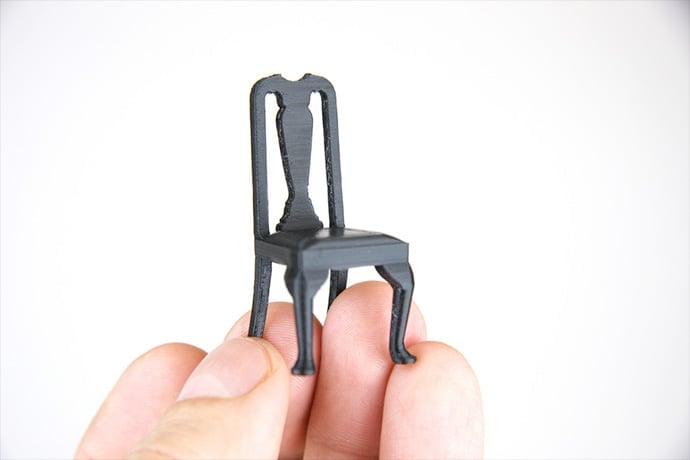It should be obvious some 3D objects are more easily printed than other objects. A cube prints better than an open weave bracelet with thin netting lines and lots of gaps.
It’s rare, however, for objects to be either extreme.
More common are objects that include shapes that hang over an edge, or extrude. Or objects that require very small indents that some 3D printers might not be precise enough to print.
3D modeling best practices include:
- Create your model twice. The first time, try different ways to build the model with the fewest faces and edges as possible. Then create the model a second time based on what worked on your first try.
- As you build your model, use as few polygon shapes as possible. Look for ways to use one polygon shape instead of two or three, for example.
- Reduce the number of times you combine shapes to add or subtract them as a single unit. You add potentially unprintable surfaces and edges when you add or subtract shapes together.
- Assign unique names to every shape when you create them. This will help later when you need to identify which shape to adjust.
- Pay attention to units of measure. For example, set 1 unit equal to 1 centimeter. When you output to an STL file, specify the same unit of measure used in your model and confirm the STL file uses the defined unit.
- Turn off any shader effect in your modeling software. 3D printers print geometric edges and shaders smooth edges, giving you a false sense how your 3D print surfaces will print. For rounded edges, for example, you may need to split a few shapes into many shapes to print a smooth round surface. Strike a balance between enough edges for your model to look round and the maximum number of edges your 3D printer needs to print a round edge. Many 3D printers cannot handle a massive number of edges to define a simple round edge.
- Whenever possible, hollow out the inside of your model to save materials and keep costs low. You will need to pay attention to wall thickness to ensure the walls are thick enough to print solid and sturdy.
- Use netfabb software to open your model to find and fix any unattached edges, missing faces, and other problems.
As with any project, you get best results when you combine your ideas with project management skills and hands on experience, in this case, creating a three-dimensional model with software then using a 3D printer to print your model.
The process to create a 3D model should follow 3D modeling best practices. Here’s one video which explains how someone created a replacement piece for their camera tripod. It’s an excellent, if long, introduction to how you might take a great idea and turn it into a 3D printed object.
While this video shows how to create the object with Blendr, a free open source 3D software tool, the process applies to Maya, SketchUp, and any other software used to create objects. The menus may differ but the software design and build process is the same.
To learn more about how to create 3D models that print well, be sure to click through the links below.
Learn More
Bits to Atoms: 3D Modeling Best Practices for 3D Printing
http://www.tested.com/tech/3d-printing/460456-bits-atoms-3d-modeling-best-practices-3d-printing/
http://www.tested.com/tech/3d-printing/460165-bits-atoms-your-3d-printing-software-options/
The Essential Calibration Set
A cube you can use to calibrate your models with any 3D printer.
http://www.thingiverse.com/thing:5573
8 Tips for 3D Printing with Sketchup
Applies to any 3D software used to create models.
http://www.mastersketchup.com/8-tips-for-3d-printing-with-sketchup/
How To Make a 3D Model for 3D printing
https://www.youtube.com/watch?v=jj3E2SDByYU
Modeling for 3D Printing with Shapeways
3D modeling best practices to print with the Shapeways online service. Methods should work for printing on home 3D printers and other printing services.
https://www.youtube.com/watch?v=ZnCf-5G7DYc
netFabb Basic
http://www.netfabb.com/basic.php
Meshlab
http://meshlab.sourceforge.net/
How to Fix and Repair Your 3D Files Using Meshlab and Netfabb
http://www.shapeways.com/tutorials/how_to_use_meshlab_and_netfabb
TinkerCAD
A web browser-based tool to create 3D models.
https://www.tinkercad.com/
How To Design & Print 3D Moving Parts In Minutes (Tinkercad)
https://www.youtube.com/watch?v=v9BvoDl0thQ
Blender 3D Software: Noob to Pro/Avoiding Headaches Early On: Good 3D Modeling Practices
3D Modeling System Best Practices
University of Wisconsin guidelines for creating models as part of their coursework.
http://homepages.cae.wisc.edu/~me231/online_notes/cad/modeling%20practices.pdf
Unity Software Art Asset Guidelines
Guidelines used for this game creation software tool.
http://docs.unity3d.com/Manual/HOWTO-ArtAssetBestPracticeGuide.html
Prepare your model for 3D printing with SolidWorks
http://www.sculpteo.com/en/prepare-your-model-3d-printing-solidworks/

